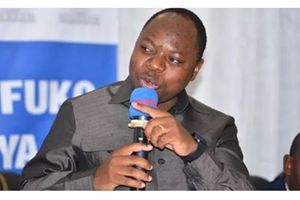Africa Urban Lab bridging global expertise and local realities to shape the urban future of Zanzibar and beyond
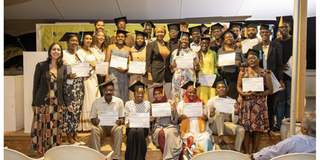
The Cohort 2024-2025
Unguja. As African cities experience some of the fastest urban growth rates in the world, the need for innovative, context-driven urban solutions has never been more pressing.
Rising to meet this challenge, the Africa Urban Lab (AUL), based at the African School of Economics Zanzibar, has emerged as a pioneering hub blending rigorous research, practical training, and policy engagement.
Through its flagship Professional Diploma in Urban Development AUL equips a new generation of urban leaders with the tools, networks, and knowledge to tackle complex urban challenges across the continent.
What sets this diploma apart is its commitment to local impact: in partnership with local institutions, AUL offers dedicated scholarships for Tanzanians and Zanzibaris, making the program more accessible to early-career professionals working in both public and private sectors.
These scholarships ensure that local talent is empowered with the tools and networks to shape the urban future of their own communities. Applications for Professional Diploma in Urban Development Cohort 2025-2026 are now open with deadline set for August 1 with scholarships also available.
In this Q&A, we explore the origins, vision, and growing impact of the Africa Urban Lab—from its work empowering local talent in Zanzibar to its ambition of transforming urban policy and planning throughout Africa.
Can you walk us through the origin story of the Africa Urban Lab—what specific urban challenges or opportunities led to its creation in Zanzibar?
The Africa Urban Lab (AUL) was launched in 2024 as the inaugural research and training center of the African School of Economics Zanzibar. The Lab was born out of the urgent need to address Africa’s rapid urbanization, which presents both a major development challenge and a tremendous opportunity.
East Africa is urbanizing extremely quickly, with four out of the top five fastest-growing urban populations in the world. We’re entering a transformative era for the region, and there’s good reason for optimism: urbanization has historically been accompanied by significant economic growth.
However, there’s a gap between academic research and the practical realities faced by city governments across the continent. The AUL was designed to help close this gap—acting as a "teaching hospital" for urban leaders where cutting-edge research meets real-world problem-solving.
Who were the key partners involved in its inception?
The Lab was made possible through the vision of ASE’s Founder, Prof. Leonard Wantchekon, and AUL Director and Founder Kurtis Lockhart, with foundational support from the John Templeton Foundation. We also collaborated with partners such as the Charter Cities Institute and Fumba Town developers, alongside municipal stakeholders in Zanzibar and tremendous support from the Zanzibar Presidential Delivery Bureau (ZPDB). The Indian Institute of Technology Madras Zanzibar also welcomed us to their new campus outside Fumba Town to deliver instruction for our 2024/2025 Professional Diploma in Urban Development.
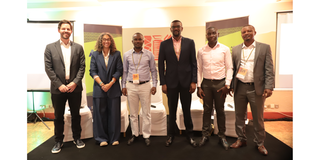
The launch of the UCCC project with Africa Urban Lab, Makerere University, Ardhi University and Kenyatta University
Why was Zanzibar chosen as the base for the Lab, and how does the island’s urban transformation reflect wider trends across African cities?
Zanzibar is uniquely positioned to become a vibrant economic hub—both geographically and symbolically. It has historically served as a crossroads for cultures and trade from around the world, contributing to its culture of openness and making questions of urban form especially interesting.
Now, as Zanzibar is being transformed by rapid urbanization, the island faces many of the same pressures confronting urban areas across Africa: population growth, tourism-driven development, land constraints, and environmental vulnerability. In fact, the largest city in Zanzibar, Zanzibar City, is growing at an astonishing rate of 4.55% per year.
Establishing the Lab in Zanzibar allowed us to ground our work in a place that is both emblematic of the continent’s urban challenges and full of potential as a model for urban development and future growth.
What was the initial vision and mission of the Africa Urban Lab, and how has that evolved over time?
Our founding vision is twofold: (1) to conduct frontier research on African urbanization, and (2) to train the next generation of African city builders and urban leaders. Over time, we’ve grown into a full-service hub for research, policy implementation, and education & training, launching both long-form programs like the Professional Diploma in Urban Development and short, intensive training for working officials. While the core mission remains the same, we’ve expanded to focus more explicitly on research-to-policy translation and capacity-building among urban practitioners across the continent.
What would you say are the most significant contributions the Lab has made to urban policy, planning, or research across the region since its founding?
We’ve helped catalyze a pan-African project around urban expansion planning, and the need for applied, context-specific urban governance solutions. Through our research clusters—like Urban Expansion & the Periphery and Innovative Urban Governance—we’ve produced evidence that’s now shaping policies in cities across East and Southern Africa.
In addition, our educational programs are equipping mayors, planners, and civil servants with practical skills, many of whom return to their cities to drive tangible change. For example, we recently graduated our first cohort of 38 students from the Professional Diploma in Urban Development. We’re extremely proud of this milestone and look forward to seeing how our students carry the lessons they’ve learned forward into their work.
We’ve also recently opened admissions for the 2025/2026 cohort of the Diploma program. We have a variety of scholarships available and are excited to welcome a new cohort later this year.
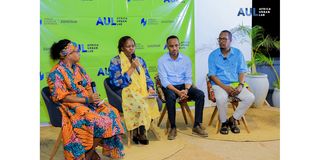
Part of the public roundtable on urban finance in Zanzibar with experts from Uganda, Ethiopia, and Kenya.
Can you share any flagship projects, research outputs, or urban interventions that have had measurable impact on communities in Zanzibar or elsewhere?
One of our flagship efforts is the University Coalition on Curricula for Cities, together with Ardhi University (Tanzania), Kenyatta University (Kenya), and Makerere University (Uganda). The project aims to co-create a cutting-edge, Africa-focused urban planning curriculum for the 21st century. It was launched at the New Cities Summit on June 13th in Nairobi.
Another project is our work with Urban Expansion Planning, led by Dr. Patrick Lamson-Hall. We are working together with municipalities and local governments all over Africa to equip them to face future growth at the city’s periphery. Already, urban expansion planning has led to tangible benefits for secondary cities in Ethiopia, including higher household incomes, improved service provision, and decreased commute times. We’re actively scaling this approach to cities in Tanzania and Kenya.
We have also contributed to public discourse through high-level lectures, including a session on Urban Finance in African Cities led by expert Ms. Astris Haas, and a thought-provoking lecture on the Future of African Cities delivered by the renowned urban planner Alain Bertaud. Looking ahead, the Lab is committed to convening more leading voices in Zanzibar to foster dialogue and share critical insights on urban challenges and opportunities across the continent.
On the research side, we’ve contributed to the growing body of knowledge on urban laws, special economic zones, urban and municipal finance and public service delivery mechanisms in rapidly urbanizing contexts. Our work on SEZ legislation in Tanzania and on Municipal Finance throughout the continent are two examples.
What are the main challenges the Lab has encountered—whether in funding, local government collaboration, or public engagement—and how have you addressed them?
Like many new institutions, we’ve had to navigate the complexities of aligning local government priorities with academic timelines. Public engagement is also a continual effort—ensuring that our research resonates beyond the classroom or policy brief.
We’ve addressed this by anchoring our programs in real-world projects, emphasizing co-creation with local institutions, and building a network of practitioners who remain connected through our growing “community of practice” model. Our partners have been crucial for our growth and impact, and we’re very grateful for their ongoing support.
For example, we’ve partnered with the Zanzibar Research Centre for Socio-Economic and Policy Analysis to host multiple policy roundtables with Zanzibari government agencies. Sessions have covered topics ranging from SEZ policy in Zanzibar to strategies for attracting foreign direct investment. These collaborations have helped us ground our work in real challenges, demonstrating the importance of locally-embedded research.
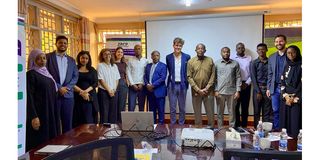
From a roundtable discussion held by the AUL and ZRCP on Global Value Chains in April 2025 and attended by various Zanzibari government officials and the private sector
How is the Africa Urban Lab structured in terms of staffing, governance, and partnerships with academia, civil society, or international donors?
The Lab is led by a multidisciplinary team of researchers, program staff, and senior advisors. We’re hosted at ASE-Zanzibar and supported by a network of partner institutions ranging from African universities–including Makerere University (Uganda), Bahir Dar University (Ethiopia), Kenyatta University and the University of Nairobi (Kenya), Ardhi University, University of Dodoma and the State University of Zanzibar (Tanzania)–to international organizations like the International Growth Centre (IGC-Cities that Work) and UN-Habitat. Our governance includes oversight from ASE leadership and a growing advisory circle of urban economists, planners, and public policy scholars.
In what ways is the Lab helping to shape or influence future urbanization policies on the continent—particularly regarding climate resilience, informal settlements, or heritage preservation?
Through our research and training efforts, we are equipping urban leaders with frameworks for sustainable expansion planning, municipal finance approaches, and inclusive governance.
More specifically, our Urban Expansion cluster addresses issues such as infrastructure access, informal settlement integration, and environmental vulnerability. Many cities across East Africa are expanding into sensitive environmental spaces, including flood- and landslide-prone areas. Urban expansion planning helps ensure that these spaces are protected, directing growth towards areas that face lower risks.
Additionally, our Cities, Culture & Technology research stream–led by Prof. Michael Muthukrishna–examines how culture influences the social processes that enable the generation and adoption of innovative ideas, products, and practices in cities. Understanding the cultural mechanisms that drive innovation can help us design, govern, and empower cities which continue to drive humanity forward.
How do you measure the Lab’s success? Are there specific indicators or milestones you use to track progress and relevance?
We look at multiple indicators: for the professional diploma, we look at the geographic diversity of our student cohorts, and most importantly, the post-program impact of our alumni in their cities and institutions.
Generally, we look at the number of partnerships formed around the continent and the effect that our Policy Implementation projects have in different African cities.
What does the future hold for the Africa Urban Lab? Are there plans for expansion, replication in other African cities, or deeper integration with regional development strategies?
Absolutely. We envision AUL becoming a model replicated across the continent—anchored in place but networked globally. We’re exploring collaborations in West and Southern Africa and are working on deepening our ties with regional organizations and multilateral partners to embed our training programs into larger development strategies. Expansion into Master's-level training and thematic policy labs—on topics like infrastructure finance and land governance—is also on the horizon.




